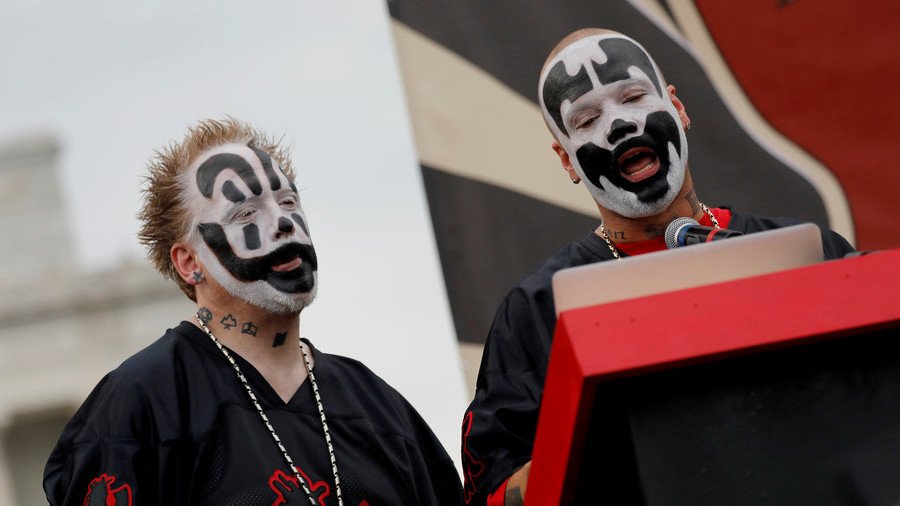Insane Clown Privacy: Juggalo makeup is the key to defeating facial recognition software

Facial recognition software is becoming more pervasive, which has some Orwellian implications for privacy. Security and privacy researcher Ian O’Neill has discovered a way to beat the system: get decked out in Juggalo paint.
“Facial recognition generally relies on looking for a few different important facial features - nose, eyes, mouth, eyebrows, and jawline,” O’Neill told RT. O’Neill discovered that Juggalo makeup, worn by fans of ‘the worst band in the world,’ Insane Clown Posse, can defeat most kinds of facial recognition tech.
“This makeup actually replaces the jawline, as well as a few other large features, which makes it very difficult to match it to other regular faces,” O’Neill said. While heavy makeup is often used in other musical subcultures - like the ‘corpse paint’ favored by black metal artists - only Juggalo makeup has the jawline-obscuring, face hiding characteristics needed to reliably fudge facial recognition software.
i made a breakthrough. it turns out juggalo makeup defeats facial recognition successfully. if you want to avoid surveillance, become a juggalo i guess pic.twitter.com/kEh7fUQeXq
— TAHKION (@tahkion) July 1, 2018
for anyone wondering why some face changes evade facial recognition and others don't, here's a visualization of how landmarks are placed on a few examples. juggalo makeup is particularly effective as it basically totally redefines what is interpreted as the jawline pic.twitter.com/dFSx5FEGc9
— TAHKION (@tahkion) July 1, 2018
As far back as 2016, a Georgetown Law Center report revealed that half of all American adults have had their faces recorded and included in police databases. That same year, police in Maryland were using facial recognition software to identify protesters and match them with mugshots.
More recently, online retail giant Amazon has started selling its big-brother-like ‘Rekognition’ technology to government and law enforcement agencies across the US. Rekognition can track, identify, and analyze people in real time, recognizing up to 100 individual people in a single image. The American Civil Liberties Union (ACLU) has warned that the rollout of Rekognition “raises profound civil liberties and civil rights concerns.”
O’Neill is concerned about the implications of facial recognition, and he warns that it’s not just law enforcement that people should be worried about.
“It could be potentially used maliciously, like waiting outside hospitals to sell information on who was there to insurance companies, or other things that might be morally questionable,” he said. After the revelation earlier this year that Facebook sent an undercover doctor to several top US hospitals to try to solicit confidential patient information, leaving such powerfully invasive technology in the hands of Silicon Valley might generate a lot of interest in new privacy hacks.
However, hiding as a Juggalo could draw more attention from law enforcement. As a predominantly white, underclass subculture, Juggalos are designated as a “loosely organized hybrid gang” by the FBI. The National Gang Intelligence Center has warned that as well as paying good money for songs like ‘Miracles’, Juggalos will “evolve into a more sophisticated criminal entity through associations with hardened, experienced gang members."
The band, led by Detroit rappers ‘Violent J’ and ‘Shaggy 2 Dope,’ launched an unsuccessful discrimination lawsuit against the FBI in response to the designation. Despite having the backing of the ACLU, the lawsuit was thrown out of court last December, leaving the band penniless and begging billionaire fan Elon Musk for money on Twitter.
Yo @elonmusk Thank you ninja, but how about showing our wounded pockets how much you like them somehow...They’ve been wounded since our battle with the FBI.We’re open to anything you come up with my wealthy and powerful friend... 🤪 VJ
— Insane Clown Posse (@icp) July 4, 2018
However, Juggalo makeup does not fool all kinds of facial recognition software. Technology that uses depth-perception instead of light-recognition, like the kind used by Apple’s Face ID unlocking system on its latest iPhones, won’t be tricked by patchy clown makeup.
Right now, wearing a mask is the only effective way to fool depth-perception systems, making it all but impossible to hide in plain sight.
Other unproven ways to hide involve exploiting vulnerabilities inherent in the machine-learning process. Last year, a team of MIT researchers found that Google’s object-recognition algorithm could be fooled by objects painted in patterns that cause the AI software to flip out. In one case, the researchers tricked the AI into thinking a 3D-printed toy turtle was a rifle.
“Unfortunately, most of the techniques to avoid facial recognition on yourself are generally quite drastic,” O’Neill told RT. “Instead it may be better to limit the sorts of online exposure you have on social media, and consider what that facial recognition identity might be used for. Even if you can’t prevent people from recognizing your face, you can limit what they can do with that information.”
O’Neill also pointed out that while Juggalo makeup is currently effective at hiding your face from light-based programs, it might not be that way for long. According to the security researcher, algorithms that can detect heavy makeup and adjust the photo to make a match will not be tricky to implement, and it will only take time.
Until then, the safest place to remain anonymous might be the ‘Gathering of the Juggalos,’ a yearly music festival organized by the Insane Clown Posse’s record label, Psychopathic Records. This July, thousands of fans will gather in Thornville, Ohio, for four days of rap, rock, pro wrestling, Faygo-chugging and ‘whoop whooping,’ all safe from Big Brother’s gaze behind their thickly-applied clown makeup.
Even the biggest parties on the planet reach a crescendo! #Whoopstock hits it’s epic finale when ICP delivers the final musical performance of the 19th annual Gathering Of The Juggalos.Wreck shop, hurl pop! Whoop whoop! pic.twitter.com/9lRMK7ctQ3
— Insane Clown Posse (@icp) June 29, 2018
Like this story? Share it with a friend!















